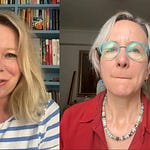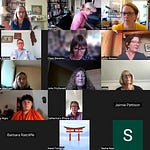This was a fascinating discussion with Leah about the tricky business of writing about family members. What to do when they give their consent and then retract it, and how do we live with knowing loved ones aren’t happy about us writing our version of events?
We also spoke about how funny it is - or not so funny, actually - that so many of those who protest haven’t actually read the memoir! In Leah’s case it is a memoir which cleverly and subtly addresses these very topics. In Where You End and I Begin she asks questions about victimhood, and is careful to show her working out of these ethical dilemmas on the page. It is a sensitive and intelligent book about so much more than just her complex relationship with a charismatic and damaged mother.
It is also a book that came up against an attempted cancelling, and therefore a prime example of many a writer’s fear of the worst things happening.
You can also catch up on
brilliant Substack if you don’t know it already. It is one of my favourites for personal narrative and sparky and thoughtful writing about current issues.If you are writing or considering writing a memoir I really urge you to listen to this interview, which gives such an honest critique of the tricky topic of ethics.
At the end of this interview, Leah has an interesting angle on the recent exposé of Canadian author and Nobel Laureate, Alice Munro. So stick with it!















Share this post